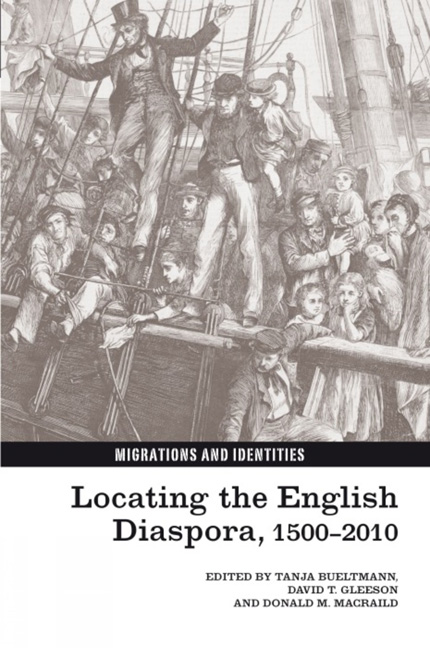Book contents
- Frontmatter
- Contents
- Notes on Contributors
- Introduction. Locating the English Diaspora: Problems, Perspectives and Approaches
- 1 Mythologies of Empire and the Earliest English Diasporas
- 2 The English Seventeenth Century in Colonial America: The Cultural Diaspora of English Republican Ideas
- 3 Fox Hunting and Anglicization in Eighteenth-Century Philadelphia
- 4 The Hidden English Diaspora in Nineteenth-Century America
- 5 An English Institution? The Colonial Church of England in the First Half of the Nineteenth Century
- 6 The Importance of Being English: English Ethnic Culture in Montreal, c.1800–1864
- 7 Anglo-Saxonism and the Racialization of the English Diaspora
- 8 ‘The Englishmen here are much disliked’: Hostility towards English Immigrants in Early Twentieth-Century Toronto
- 9 Cousin Jacks, New Chums and Ten Pound Poms: Locating New Zealand's English Diaspora
- 10 ‘Cooked in true Yorkshire fashion’: Regional Identity and English Associational Life in New Zealand before the First World War
- 11 Englishness and Cricket in South Africa during the Boer War
- 12 An Englishman in New York? Celebrating Shakespeare in America, 1916
- 13 The Disappearance of the English: Why is there no ‘English Diaspora’?
- Index
12 - An Englishman in New York? Celebrating Shakespeare in America, 1916
- Frontmatter
- Contents
- Notes on Contributors
- Introduction. Locating the English Diaspora: Problems, Perspectives and Approaches
- 1 Mythologies of Empire and the Earliest English Diasporas
- 2 The English Seventeenth Century in Colonial America: The Cultural Diaspora of English Republican Ideas
- 3 Fox Hunting and Anglicization in Eighteenth-Century Philadelphia
- 4 The Hidden English Diaspora in Nineteenth-Century America
- 5 An English Institution? The Colonial Church of England in the First Half of the Nineteenth Century
- 6 The Importance of Being English: English Ethnic Culture in Montreal, c.1800–1864
- 7 Anglo-Saxonism and the Racialization of the English Diaspora
- 8 ‘The Englishmen here are much disliked’: Hostility towards English Immigrants in Early Twentieth-Century Toronto
- 9 Cousin Jacks, New Chums and Ten Pound Poms: Locating New Zealand's English Diaspora
- 10 ‘Cooked in true Yorkshire fashion’: Regional Identity and English Associational Life in New Zealand before the First World War
- 11 Englishness and Cricket in South Africa during the Boer War
- 12 An Englishman in New York? Celebrating Shakespeare in America, 1916
- 13 The Disappearance of the English: Why is there no ‘English Diaspora’?
- Index
Summary
Now through the Interlude gates, and from all sides, a jocund festival pours into the illumined space […]: the folk-festival of Elizabethan England. Simultaneously, in different parts, as in a merry rural fair, various popular arts and pastimes begin, and continue together: Morris dancers and pipers, balladists and play-actors, folk dancers, fiddlers, clowns, and Punch-and-Judy performers romp, rant, parade, and jingle amongst flower-girls and gay-garbed jesters spangling by the bright venders’[sic]booths.
Though recreating a May fair in rural Elizabethan England, the actual re-enactment of this scene did not occur in the English countryside. Instead, it was presented in front of thousands of spectators at Lewisohn Stadium in New York City. The year was 1916 and the occasion was the 300th anniversary of William Shakespeare's death. As part of the festivities commemorating that event, New Yorkers participated in Percy MacKaye's ‘community masque’, Caliban by the Yellow Sands, which included a ‘[c]elebration of an Elizabethan May Day Festival on the outskirts of an English town’.
It may seem peculiar that the inhabitants of a modern American metropolis should indulge in old-fashioned rural customs in honour of a long-departed English poet, especially at a time when the United States was experiencing serious socio-political problems, including increased immigration from eastern and southern Europe and uncertainty as to entering the First World War. Even more strangely, Caliban by the Yellow Sands was not an isolated event that could be attributed to the eccentric tastes of a prominent individual or group. Across the US, wide sections of American society participated in hundreds of Shakespeare tercentenary tributes, many of which reconstructed the ‘merry old England’ of the Elizabethan period. With this in mind, this chapter examines the issues of ‘Englishness’ that were repeatedly broached in American Shakespeare tercentenary celebrations. To what extent was Shakespeare seen as ‘English’ by their participants? What was their definition of ‘Englishness’ and why were they so fascinated with it? And, finally, what purposes did that version of ‘Englishness’ serve in 1916 and how was it adapted to fit the American context? To answer these questions, the idea of Elizabethan England promoted by the tercentenary entertainments will be explored, together with their representations of Shakespeare and Elizabeth I.
- Type
- Chapter
- Information
- Locating the English Diaspora, 1500–2010 , pp. 205 - 221Publisher: Liverpool University PressPrint publication year: 2012



